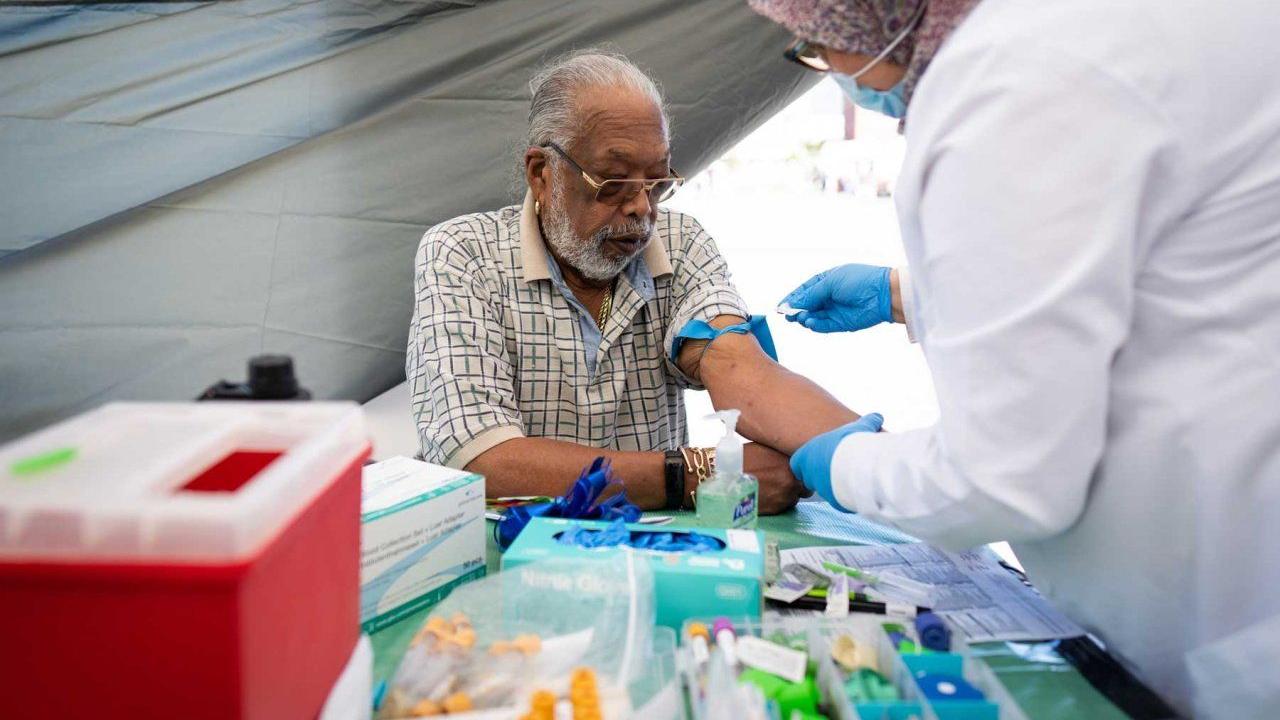
Ray Fisher gets a prostate specific antigen test administered outside the UCSF Helen Diller Family Comprehensive Cancer Center during and SF CAN event in 2022. Photo by Maurice Ramirez
“Later,” James McCray Jr. told himself, he’d deal with it later.
McCray was the long-time pastor of Jones Memorial United Methodist Church, located just blocks away from UCSF Medical Center at Mount Zion. In fact, early in his tenure, McCray partnered with the medical center’s doctors to conduct health education among the congregation.
“Black men are less likely to be part of prostate cancer research, less likely to be screened, and are more likely to be diagnosed at a later stage.”
Nynikka Palmer, DrPH, MPH
In 2004, Mount Zion doctors conducted prostate cancer screenings at the chapel.
“The church’s health ministry had publicized everywhere that Dr. McCray was going to lead us in the digital examination for cancer,” remembers McCray.
“Well,” he says, laughing, “I soon found out that ‘digital’ was not what I thought it was.”
As part of a digital rectal exam, a physician feels the back wall of the prostate gland for swelling, tenderness and lumps that could be signs of cancer. McCray’s exam revealed his prostate was swollen, and doctors urged him to go to his medical provider for more tests.
“I said, ‘Yeah, okay – when I get back from vacation.’”
Looking back now, he adds. “You should never do that.”
Prostate cancer kills more than twice as many Black men
Nationally, 1 in 8 men will be diagnosed with prostate cancer during their lifetime. Most will survive. But Black men are more likely to be diagnosed with the cancer and more than twice as likely to die from it than their white peers, explains UC San Francisco Associate Professor, Medicine Nynikka Palmer, DrPH, MPH.
This is why Black men should start getting screened for prostate cancer between the ages of 40 and 45 with prostate-specific antigen (PSA) blood tests. Based on initial results, men and physicians should discuss how frequently to repeat the test in the future.
“Prostate cancer actually has a very high survival rate,” she says. “Partly because it’s a slow-growing disease, but partly because if you get the care that’s needed, you can usually avoid dying of it. So when I hear about deaths in my own community, in the communities that I work in, it’s frustrating because most of the time, they didn’t have to happen.”
By 2014, prostate cancer was among five cancers that made up nearly half of all cancer diagnoses and deaths in San Francisco, alongside breast, colorectal, liver and those related to tobacco use. And death rates among the city’s Black men were roughly five times higher than some communities.
To turn the tide, UCSF’s Helen Diller Family Comprehensive Cancer Center founded the San Francisco Cancer Initiative (SF CAN) in 2016. The initiative uses data from sources like the Greater Bay Area Cancer Register, housed at UCSF, to create tailored cancer prevention and screening strategies at the neighborhood level. The strategies are carried out by SF CAN’s five task teams, each dedicated to one of the city’s five high-burden cancers – which each team conducting outreach and advocacy.